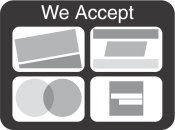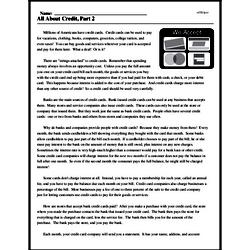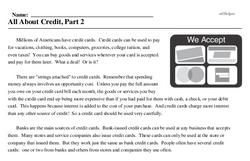All About Credit, Part 2
Millions of Americans have credit cards. Credit cards can be used to pay for vacations, clothing, books, computers, groceries, college tuition, and even taxes! You can buy goods and services wherever your card is accepted and pay for them later. What a deal! Or is it?
There are "strings attached" to credit cards. Remember that spending money always involves an opportunity cost. Unless you pay the full amount you owe on your credit card bill each month, the goods or services you buy with the credit card end up being more expensive than if you had paid for them with cash, a check, or your debit card. This happens because interest is added to the cost of your purchase. And credit cards charge more interest than any other source of credit! So a credit card should be used very carefully.
Banks are the main sources of credit cards. Bank-issued credit cards can be used at any business that accepts them. Many stores and service companies also issue credit cards. These cards can only be used at the store or company that issued them. But they work just the same as bank credit cards. People often have several credit cards: one or two from banks and others from stores and companies they use often.
Why do banks and companies provide people with credit cards? Because they make money from them! Every month, the bank sends cardholders a bill showing everything they bought with the card that month. Some banks allow cardholders to pay just part of the bill each month. If a cardholder chooses to pay part of the bill, he or she must pay interest to the bank on the amount of money that is still owed, plus interest on any new charges. Sometimes the interest rate is very high-much higher than a consumer would pay for a bank loan or other credit. Some credit card companies will charge interest for the next two months if a customer does not pay the balance in full after one month. So even if the second month the consumer pays the full balance, he might still be charged interest!
Some cards don't charge interest at all. Instead, you have to pay a membership fee each year, called an annual fee, and you have to pay the balance due each month on your bill. Credit card companies also charge businesses a percentage of the bill. Most businesses pay a fee of one to three percent of the sale to the credit card company just for letting customers use credit cards to pay for their goods or services.
How are stores that accept bank credit cards paid? After you make a purchase with your credit card, the store where you made the purchase contacts the bank that issued your credit card. The bank then pays the store for everything that is charged on the card, less the service fee. The bank then bills you for the amount of the purchase. The bank pays the store, and you pay the bank.
Each month, your credit card company will send you a statement. It has your name, address, and account number on it. It tells your credit limit, the total amount of money you can charge on your credit card. It will tell you the due date for your payment. It will show you the previous balance, or the amount you owed last month. It will show your payments and credits. This is how much you paid last month and how much money was credited to your account. If you didn't pay the whole balance, you will pay interest on the money you owe.
The credit card statement will also list your purchases. This is a detailed description of all of your purchases for the past month. It will show the new balance, which is how much you owe now. It will show the minimum payment due. But be careful! If you only pay the minimum payment, interest will keep building on the majority of what you owe. It could take many years to pay off your balance if you only make the minimum payment!
Credit cards make buying very easy. You should be very careful not to charge more than you are able to pay. Credit cards themselves are also an expense. The interest rates for credit cards are usually much higher than the interest rates on bank loans. An unpaid credit card balance can build up interest quickly. Before you use a credit card, make sure you:



